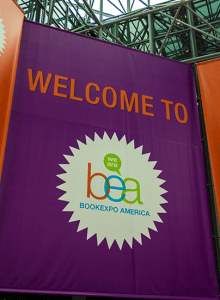 It’s about time for Book Expo America (May 27-29), the big New York-based trade fair for the book industry, and this year’s programming includes a large number of translation events. The featured country this year is China, so look for a lot of events featuring Chinese publishers, editors, and authors. I’ve included the most translation-centric of these in my listing below, and you can find more here (China-related events) and here (all others). BEA is held at the Javits Center and is open only to registered visitors (registration info here); some of these events, though, will be held off-site and are open to everyone without registration (see the notation off-site in the listings below). The PEN Translation Committee has put together three sessions on issues of particular interest to translators and those who publish them (see the notation PEN below).
It’s about time for Book Expo America (May 27-29), the big New York-based trade fair for the book industry, and this year’s programming includes a large number of translation events. The featured country this year is China, so look for a lot of events featuring Chinese publishers, editors, and authors. I’ve included the most translation-centric of these in my listing below, and you can find more here (China-related events) and here (all others). BEA is held at the Javits Center and is open only to registered visitors (registration info here); some of these events, though, will be held off-site and are open to everyone without registration (see the notation off-site in the listings below). The PEN Translation Committee has put together three sessions on issues of particular interest to translators and those who publish them (see the notation PEN below).
Wednesday, May 27:
Best Translated Book Awards, awards ceremony hosted by Chad Post, more info here. Eastside Stage, 2:30 – 2:55 p.m. Party to follow off-site at The Folly, 92 W. Houston St., 5:00 – 7:00 p.m.
Retranslating the Great Works of Literature: How and Why? (PEN), with Burton Pike, Sandra Smith and Robert Weil, more info here. Eastside Stage, 4:00 – 4:25 p.m.
Thursday, May 28:
Reaching the Reader: Publicizing International Literature (PEN), with Allison Markin Powell and Juliet Grames, more info here. Eastside Stage, 10:00 – 10:25 a.m.
BEA Selects Translations – Adult Fiction, with Chad Post, more info here. Eastside Stage, 10:00 – 10:25 a.m. (Yes, both this event and the one listed before it seem to be scheduled for the same time and place. I’ve alerted BEA and will update this post when they’ve fixed it.)
The Archipelago Norman Manea, with Bogdan-Alexandru Stănescu joining Manea. Not technically a translation event, but if you’re reading this, I thought you might also be interested in attending a classy foreign-literature event while you’re at BEA. More info here. Eastside Stage, 11:30 – 11:55 a.m.
Literary Translation Between China and the US: Status Quo and Perspectives, with Eric Abrahamsen, Karen Christensen, Bi Feiyu, Liu Guohui, Li Jianchen, and Liu Zhenyun, more info here. Room 1E11, 2:00 – 2:55 p.m.
Death of a Happy Man: Conversation with Giorgio Fontana, with Mark Rotella joining Fontana. This one, too, is a literary rather than a translation event. More info here. Eastside Stage, 2:30 – 2:55 p.m.
Friday, May 29:
Baiting the Hook: How to Catch an Editor’s Interest (PEN), with Corinna Barsan and Ezra Fitz, more info here. Eastside Stage, 10:00 – 10:25 a.m.
BEA Selects Translations – Crime/Thriller, with Tom Roberge, more info here. Eastside Stage, 10:30 – 10:55 a.m.
Running Through Beijing + Beijing Beijing, with Feng Tang and Xu Zechen in conversation with Canaan Morse, more info here. Off-site, at the UWS Barnes and Noble, Broadway at 82nd St., 7:00 pm.
Saturday, May 30:
A Chinese and American Poetry Reading, with Lan Lan, Zhao Lihong, Edwin Frank, Peter Gizzi, and Canaan Morse, moderated by Eleanor Goodman, more info here. Off-site, at the Bowery Poetry Club, 308 Bowery, 1:00 p.m.
Given that the guest country for this year’s Expo is China, the BEA schedule also contains a number of “signing ceremonies” marking the collaboration of Chinese and U.S. publishing houses. If you’d like to attend some of these, see the general Global Market Forum: China listings here. You’ll also find a long listing of off-site literary events connected with the expo here.


Another one for the BEA-related calendar:
Read Russia is also holding a prize ceremony for its Read Russia Prize for works of Russian literature in English translation, on Friday, May 29, at the Grolier Club.
Professor Gary Saul Morson, author, translator, and Frances Hooper Professor of the Arts and Humanities at Northwestern University, will help present the awards to the winning translators and publishers. Professor Morson, whose popular classes at Northwestern on Russian literature touch hundreds of students every year, also will present a special new lecture: “Because Everyone Needs a Little Russian Literature.”